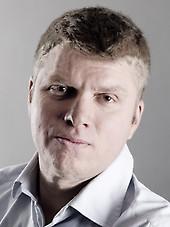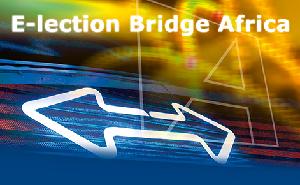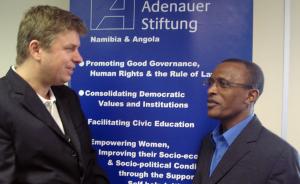Asset Publisher
"Personal human contact is crucial."
E-lection Bridge Africa: Interview with Libolly L. Haufiku
Asset Publisher
The view from the KAS office window in Windhoek includes several landmarks of Namibian politics. Among other things, the observer sees the brickwork laid down for the Independence Museum, as well as the constitutional court. Both places have symbolic meaning for Libolly L. Haufiku. In the past he was a member of the liberation movement, while currently he and his new party, Rally for Democracy and Progress (RDP), fight in court against the government’s manipulation of the 2009 election. Our meeting starts with a firm handshake. Haufiku is considered to be one of the most energetic and distinguished strategists in Namibian politics.
KAS MEDIA AFRICA: Can you remember your first RDP campaign, and how successful was it?
LIBOLLY HAUFIKU: I do! As a new political party, we were the new kid on the block. Most of our prominent members came from the ruling party - so it presented a real alternative to the status quo in Namibia. Our manifesto presented a new vision for the country; hence it attracted many voters who in the past never bothered to vote.
We embarked on a new campaign strategy: away from the traditional huge rallies – to a house to house and village to village campaign. Our foot-soldier campaign was a huge success. The deployment of our young members to deliver the message of the party was well received and took our political opponents by surprise. In short, it really worked!
KAS MEDIA AFRICA: I am sure you will agree that we’ve come a long way since then… What are the significant changes for you?
LIBOLLY HAUFIKU: Definitely, a lot has changed since the last elections. The party has launched a monthly newsletter called The Voice of Change, as well as a website which has afforded many young people an opportunity to communicate through social media such as Facebook.
| Biography Libolly L. Haufiku is the Secretary for International Relations for the Rally for Democracy and Progress, RDP. He received an MA in Sociology from the University of Helsinki. Prior to independence, Mr Haufiku taught English and History to Namibians in Angola and Cuba. He is a former member of SWAPO, where he served as the chief researcher at the party’s archive unit. Libolly L. Haufiku resigned from SWAPO in 2007 to join the newly launched RDP. |
KAS MEDIA AFRICA: And what about you? How digital are you personally?
LIBOLLY HAUFIKU: I am a fan of the latest gadgets on the market. For instance, I never part with my I-phone. I am hooked on Facebook, but I have yet to join the Twitter platform.
KAS MEDIA AFRICA: It seems that everywhere experts are trying to come to terms with what some call a “digital revolution”. What are the particular challenges that political communicators in Namibia face these days?
LIBOLLY HAUFIKU: The lack of access to social media platforms by the majority of rural Namibians, who play a significant role in any political transformation - that is a huge challenge indeed.
KAS MEDIA AFRICA: All over Africa, the use of cell phones is virtually exploding. Does the mobile phone play a role in your communication strategy?
LIBOLLY HAUFIKU Yes, since most Namibians own cell phones, even grannies and school kids. As a political party, we are able to reach a significant number of Namibians. For instance, invitations to meetings or party events are mainly communicated through cell phones. The party has a database of all its members – hence it makes it easier to contact individuals more effectively.
KAS MEDIA AFRICA: What do you think of social media platforms, such as Facebook and Twitter, in political communication?
LIBOLLY HAUFIKU: Facebook and Twitter are useful social media platforms but have limited users in Namibia. They are useful tools but are not widely accessible to the majority of Namibians. However, radio and TV still plays a significant role in this case. The new social media have to go a long way to replace the power of radio and TV in Africa.
| About RDP The Rally for Democracy and Progress is an opposition political party in Namibia. It was founded by two former ruling SWAPO party cabinet ministers, Hidipo Hamutenya and Jesaya Nyamu, in 2007. The launch of the RDP represents the strongest challenge to SWAPO's political dominance since the country gained its independence in 1990. |
KAS MEDIA AFRICA: The E-lection Bridge sets out to link Africa and Germany. So, what could German observers learn from political communication in Namibia?
LIBOLLY HAUFIKU: Personal human contact is crucial. Our traditions require human contact. For instance, a traditional chief prefers to meet or make personal contact rather than through a cell phone. That’s crucial to take note of!
KAS MEDIA AFRICA: The final question is always the same in this format - what is the “next big thing” in political communication?
LIBOLLY HAUFIKU: To educate electorates about the rigging of elections in Namibia. As you may be aware, we are still legally challenging the outcome of the 2009 national election, which was massively rigged. Our focus will be to expose the methods used and those responsible, and to properly train our party agents to prepare for the 2014 elections.





